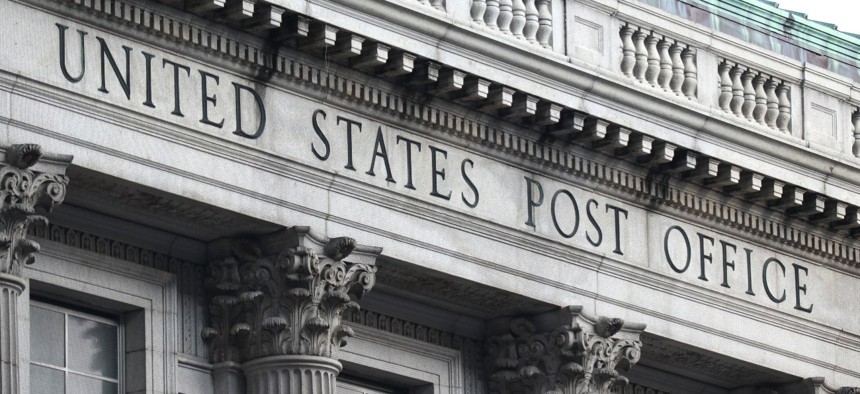
Postmaster General Louis DeJoy said the operational reforms would standardize the USPS network and allow for more precise and efficient mail sorting and delivery. Gary Hershorn/Getty Images
USPS Plans to Close More Facilities and Repurpose Those That Remain
As Louis DeJoy seeks to implement his vision, new confirmed board members could tip the scales for USPS governance.
The U.S. Postal Service is promising to do more with less, saying it can close facilities throughout the country while processing mail and packages more quickly.
Postmaster General Louis DeJoy laid out some of the specifics for that plan at the National Postal Forum in Phoenix this week, saying he would significantly reduce the number of processing plants and delivery units in major metropolitan areas. He also vowed to close the annexes that have supported capacity next to other postal buildings, while also reopening dormant facilities and repurposing existing sites. The operational reforms, he said, would standardize the USPS network and allow for more precise and efficient mail sorting and delivery.
“Dramatic change is needed, and dramatic change is what we are pursuing,” DeJoy said.
The whole process, he said, will take several years to implement. DeJoy previously promised to invest $40 billion in capital improvement projects. USPS will add new equipment while taking away older machines more suited to previous volume levels. It will also build new “employee amenities” at plants and improve lighting to “reduce stress and improve morale,” DeJoy said. In a recent interview with Government Executive, DeJoy likened the existing facilities to "dungeons" and said they are causing USPS to lose employees.
Some metro areas may currently have eight processing plants with 80 delivery units—the final sorting location where carriers pick up mail and packages for home delivery—that require hundreds of trips to move the mail between them. Postal management said it can consolidate these redundancies with a single, modernized plant that uses “standardized processes” to make the use of space more efficient. Just 10 sorting and delivery centers with more space, docks, conveyors and other equipment can replace today’s 80 units, USPS said. DeJoy predicted more modern facilities would boost morale, while fewer trips to move mail between facilities would reduce the Postal Service’s carbon footprint.
“We are looking to make some big changes,” DeJoy said. “Our current processing plant and transportation network is, well, not good. We process mail and packages in a complicated, illogical, redundant, and inefficient way.”
Dave Partenheimer, a USPS spokesman, said those changes were intended only to make the delivery network more intentional and efficient, not to reduce the agency's headcount. Some employees may be impacted by the consolidations, he added, but management expects the overall workforce to grow.
"Any impact on employment that may be required as a result of efficiency gains will easily be accommodated from additional growth expectations and the normal attrition we experience," Partenheimer said. "We expect to be in a hiring mode for many years to come."

The Postal Service already went through one round of facility consolidations last year, when it closed 18 mail processing plants. USPS said at the time it would help the agency transition to the increase in package volume. DeJoy has also made it a priority since early in his tenure to reduce the number of mail trips, though his first attempt at that reform led to unprecedented mail delays and a quick reversal of his policy.
DeJoy could face some resistance in implementing his vision as the Senate last week confirmed President Biden’s nominees for the final two vacancies on the postal board of governors. Dan Tangherlini, a Democrat, and Derek Kan, a Republican, will give Biden’s nominees a majority among the Senate-confirmed members of the board. The previously confirmed board members appointed by the current president have voiced significant reservations about elements of DeJoy’s plans, while the newly confirmed governors vowed to reexamine them.
About a decade ago, USPS pushed for the consolidation of hundreds of mail processing plants to allow for slower mail delivery. DeJoy previously said as part of his 10-year business plan he would resume closing some of the processing centers it never got around to shuttering after it paused the closures in 2015. USPS said it would use “data-driven analytics” to “strategically implement some of those consolidations where facilities remain underutilized.”
A 2018 inspector general report found USPS realized just 5% of the $1.6 billion in savings it had projected from the consolidations. The agency successfully shuttered 141 plants in the first phase of its plan, but pulled the plug on its second phase to close an additional 82 plants when it was halfway through. Lawmakers at the time pleaded with postal management to suspend its plan—which would have cost thousands of jobs and further reduced delivery standards—and USPS ultimately agreed with the misplaced hope it would lead to a legislative postal overhaul. It took until this year for the major provisions of that reform to become law.
As that postal reform law took $107 billion in liabilities off the agency’s books, the postmaster general said USPS would become financially sustainable in 2024. He also vowed to finally meet the agency’s goal of delivering 95% of mail on time in the same timeframe.
While DeJoy this week said he would eliminate annex facilities, he previously added them to supplement package processing near existing processing centers. The postmaster general previously told Government Executive his overall planned consolidations were “minimal” and “just for refinement.” DeJoy stressed this week that his changes were simple common sense.
“I wish I could say it is ingenious,” DeJoy said. “It is not. It is obvious. If you were building a Postal Service from scratch today this is what you would do.”
This story has been updated with additional comment from the Postal Service.







